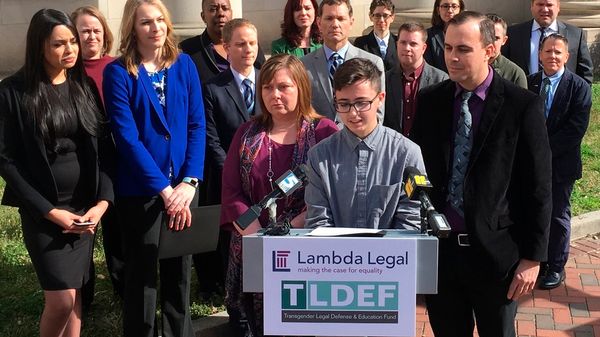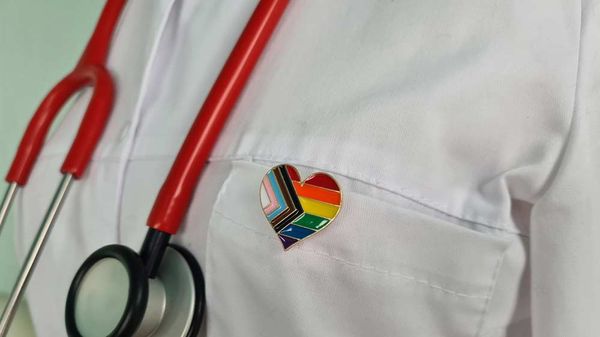November 26, 2012
Denver Honors Trans Day of Remembrance with Candlelight Vigil
Lindsay King- Miller READ TIME: 3 MIN.
On November 20, the Gender Identity Center of Colorado, along with Out Boulder and Keshet, held a candlelight vigil at Jefferson Unitarian Church in honor of the Transgender Day of Remembrance.
Created in 1998 as a way of honoring transgender victims of violence, specifically those who have been murdered because of their gender, Transgender Day of Remembrance is now observed on November 20 across the United States and in at least twenty other countries. It serves as a memorial for the dead as well as an opportunity to increase awareness of the dangers and obstacles transgender and gender non-conforming people still face.
"Trans people are marginalized at every turn," said Karen Scarpella, Program Director of the Gender Identity Center. "They're denied their basic civil rights and human rights. Transgender Day of Remembrance has several purposes, but one is to draw attention to that. These people are generally more likely to be homeless, unemployed, underemployed, harassed in school and on the job. Many people lose their families when they transition. They have no one to support them."
Without those support systems, transgender and gender-non-conforming people are disproportionately likely to be victims of violence and hate crimes. While accurate figures are difficult to come by, the Gay and Lesbian Alliance Against Defamation estimates that a transgender person is murdered every month in the United States. The National Coalition of Anti-Violence Programs indicates that in 2011, 40 percent of victims of anti-LGBT hate crimes were transgender women.
"It's scary that this kind of violence exists in this day and age," said Jen Spolnik of Out Boulder. "It makes it difficult for people to come out and be who they really are. Some people may never accept that side of themselves, because they're afraid of becoming victims."
Between November 20, 2011 and November 20, 2012 the worldwide violent death toll for transgender people was 72, according to transgenderdor.org, the official Transgender Day of Remembrance web site.
"In the past it's been something like 25 or 30," said Kate Bowman of the Gender Identity Center. "I was hoping every year the number would get smaller. But it got bigger."
Scarpella agreed, but noted, "The change in numbers could be a change in reporting, because more light is being shed on this issue. One of the goals of Trans Day of Remembrance is to shine that light. Often what happens when a trans person is murdered is that no one really cares, and no one is prosecuted. We need to have allies stand up with trans folks and say, 'We're not taking this anymore.'"
Members of Colorado's LGBT and allied community, as well as representatives from advocacy and inclusivity organizations like One Colorado and Reconciling Works, attended Tuesday's vigil as a way of seeking and displaying the support that is so often missing in the everyday lives of transgender people.
Laura Thor, a counselor who works primarily with trans people, opened the event with a reflection on the importance of community.
"We have to be seen in order to be known, in order to be loved," she said. "If no one sees our innate gifts, we don't tend to recognize them in ourselves."
Volunteers read the name, age, date, location and cause of death for each murder victim from the past year. At the same time, a slide show projected the victims' names and photographs. One candle was lit for every name that was read. Many were from the United States, but there were also names from Brazil, France, Canada, South Africa, and elsewhere. The causes of death were shocking in their violence, one after another: stabbing, beating, fire, gunshots. An additional candle was lit in honor of transgender murder victims who died before November 20, 2011, and another in honor of transgender victims of suicide.
After the names had been read, audience members stood up to introduce themselves and share their thoughts and feelings. Brad Clark, executive director of One Colorado, rose to say, "Thank you all for living your lives authentically."
Nicole Garcia, a trans woman, spoke passionately about her refusal to hide her true gender.
"Fear kept me in the closet for years," she said, "fear that I would be one of those candles. But my fear is gone. I will not sit down. I will not be quiet. We don't have to fit what everybody else wants us to be. All I want to be is me."
As community members spoken, the slide show continued, silently displaying the names and images of murder victims who died before 2011.
"A lot of trans people who were murdered in these horrific ways were never honored," said Scarpella. They had no funerals. They were thrown away by society. It's our job to honor them by bearing witness."




